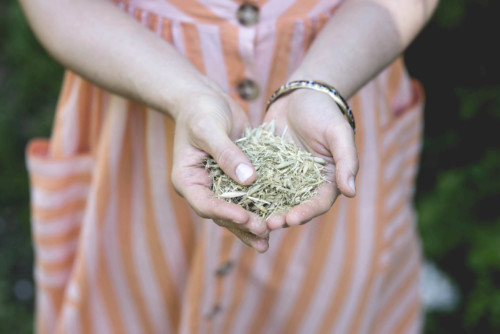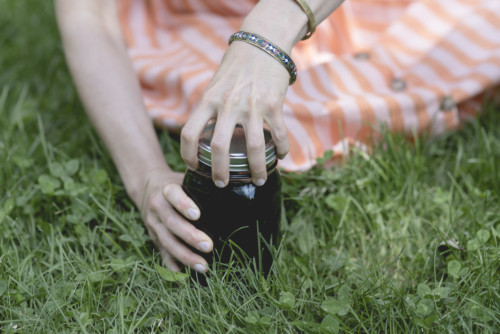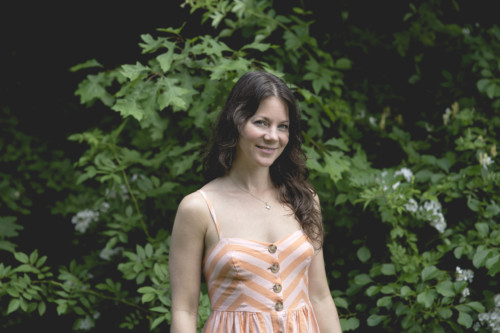
Doula Alicia Allison Talks Postpartum Herbs and Women’s Health
“As a doula, our role is to support people,” explains Alicia Allison as we sit on a shadowed patch of grass in Prospect Park. Allison is a postpartum chef and doula, and the founder of Clover + Timothy, her own company that produces teas and mists. She works individually with clients pre- and post-pregnancy, crafting plant-based meals and remedies to heal and nourish the body, and (recognizing that maternal health is even worse for women of color) she also teaches workshops at Third Root, a social justice-based community health center.
“It’s really the people that we’re supporting that actually need to be the ones asking questions and being the agents of change,” Allison says of her doula work.
“My role is to educate on what’s happening and what’s possible, and then hopefully inspiring people to learn more and make wise decisions that will give them a better birth experience– but also start to change the climate of birth collectively.”
Allison is quick to clarify she isn’t anti-Western medicine (she grew up with a microbiologist as a mother), but she does see a need for Western and alternative medicines to “engage in a conversation.” In short, her philosophy is about creating networks of support, where people are informed and secure in their choices, with a clear understanding of the long-term implications.
“We don’t live in a society that is really supporting families. And I say ‘families’ and not just ‘mothers’ because it affects everyone,” Allison stresses. “There’s such a need for it, especially here in New York… Most people though, especially if it’s the first birth (it’s an intense thing to wrap your head around, a baby coming out of your vagina!), focus all on birth preparation, and don’t spend much time focusing on postpartum preparation.”
Allison credits her own mother with inspiring her to pursue maternal health.
“I grew up with a single mother, so all things related to women’s health certainly [were] always an interest,” Allison reflects. “When my mother talked about her birth story, her face would just light up. And her birth wasn’t necessarily simple, because I was premature… I think on some level she planted the seed.”
Plagued by constant migraines from the age of 12, Allison eventually took up yoga, and from there became more seriously interested in self-healing. A project for an herb training course eventually led her to researching herbs for Caesarians.
“At the time, I knew little about what was going on in the birth world– the birth industry I’ll say, because it is an industry, you have to remember,” Allison amends. “The first article I read, I learned that we had a staggering 30% and climbing (sometimes higher depending on where) Caesarian rate. I was shocked and felt passionate about being involved in helping to, in some small way, empower people to make choices.”
(For reference, the 32.7% rate is double the WHO’s recommendation. But Allison is quick to add as an aside, “You can have a Caesarian birth and it can be beautiful and you can feel totally supported, and know that that’s exactly how your baby needed to come into the world.”)
From there, it was a short leap to recovery and postpartum herbs; her chef work came as a natural extension of her years working as waitress.
“Self-care does kind of go out the window postpartum,” Allison says. “It’s a time period where people are going through so much tremendous change very abruptly, both physiologically in terms of hormones… and then there is physical exhaustion from having just given birth, which sometimes is the equivalent of, in calories, of running a marathon… Even heating something up can be a little overwhelming when you have a crying baby or a baby who just wants to stare at you, you know?”
That chaos is where Allison steps in. Her approach draws on different practices, but is heavily influenced by Ayurvedic traditions, which consider the period post-birth as a time of time of heightened Vata, translated in the body to “dry, cold, mobile” traits.
“We need foods and herbs that are going to be generally warming, grounding– that are going to be more mucilaginous,” Allison explains of restoring balance.
Her one can’t-live-without herb? Oat straw.
“Oat straw is the same plant that oatmeal comes from,” Allison describes. “It helps to rebuild the myelin sheath around the nerve. It is high in B vitamins— it’s just incredibly comforting and has this smooth quality from the mucilage… Oat straw is like food for the nerves. And our nerves in New York are depleted. Most people are going into this experience already a little frayed around the edges, so the oat straw helps to just sew you back up, keep you more contained.”
Allison’s other go-tos are nettles (“really high in iron and chlorophyll– it’s also really an amazing kidney and adrenal tonic”) and sweetwater, a traditional Ayurvedic postpartum lactation drink made with fennel and fenugreek.
“The combination of the two is a known galactagogue (a galactagogue is anything that helps to increase breastmilk). There are some theories around how galactagogues work, though none of it is totally scientifically clear at this point. My feeling is a lot of the ways some of these herbs work is just through supporting digestion,” Allison adds.
Of course, no survey of herbs and women’s health would be complete without the ultimate supplement: raspberry leaf.
“Almost everyone knows it’s the tea that you wanna drink in the third trimester at least, or postpartum for womb health, and it is the most amazing plant we know of for toning the uterus and all the muscles of the pelvic region,” Allison reveals.
“It has an alkaloid in it called fragrine that has an affinity to all the muscles of the pelvic region, and especially the uterus. It’s astringent, so what it does is it tones the muscles, it brings tissues closer together. Ideally you’re drinking it throughout your life… it’s not an herb that I necessarily drink when I’m menstruating. I would prefer to drink it throughout the month, just to tone the uterus, because it’s astringent, so it’s actually gonna staunch blood flow a bit. It’s also a really highly nutritive plant, so it’s certainly a plan that men can consume as well. I tell the partners of my clients– they’re not all men, of course– to consume it as well.”
Considering the establishment approach to postpartum health, Allison laments the lack of attention.
“Usually there’s a six week checkup that’s like: you can exercise and have sex. Like…what?!” Allison exclaims. “There’s not enough attention to both emotional health and also physical structure, so we have a lot of parents that are suffering a lot more and more with incontinence, because they’re not having the opportunity or the education to bring their pelvic floor back into a state of health.”
That negligence can hurt women in the long-term, sometimes in unexpected ways.
“I have some older clients who have issues with their knees,” Allison points out. “They’ve even had doctors that feel that those issues can be a result of not getting proper healing postpartum.”
Over the course of the interview, Allison is full of similarly informative tidbits about birth and herbalism, like steeping plants four to eight hours, or not sitting in the wheelchair at the hospital during birth unless you need it (“just put your bag in it and wheel it in… because as soon as you sit in it, it does have an effect on your mind”).
In keeping with her philosophy of support, Allison emphasizes finding small moments for self-care wherever possible. Her favorite practice for new mothers is oiling the body– even if it’s just for five minutes before a shower.
“In the winter, sesame oil’s great but in August in New York, I would probably go with coconut or almond,” Allison recommends of specific oils. Technique wise, she advises, “Gentle strokes towards the heart, and then circular motions around the joints. Think of it like a road– always towards the heart.”
While the state of maternal health in the United States can seem dire (especially when compared to other countries), Allison does see the potential for change, particularly with the heightened consumer interest in food and what’s being put into our bodies.
“It is an industry in our country, and we have to remember to be conscious consumers,” Allison indicates of the medical establishment. “You’re reading your labels, making sure you’re not eating GMOs, pesticides, whatever. But we have to remember to be asking the same questions about our care. And also to remember that self-care is huge.”
Like Botanarchy, Allison’s work and philosophy suggest a model that straddles both words, drawing the best practices from each. Just as a doula works with the arrival of new life, so too does Allison’s work bring about new perspectives.
“The doula world really is, I feel, making a huge impact in educating people around what’s happening,” Allison reflects. “Then through that education they’re more informed to ask the right questions, or just know that they’re empowered.”
To learn more about Alicia Allison, visit her website.
Do not consume herbs without consulting a medical practitioner.








































